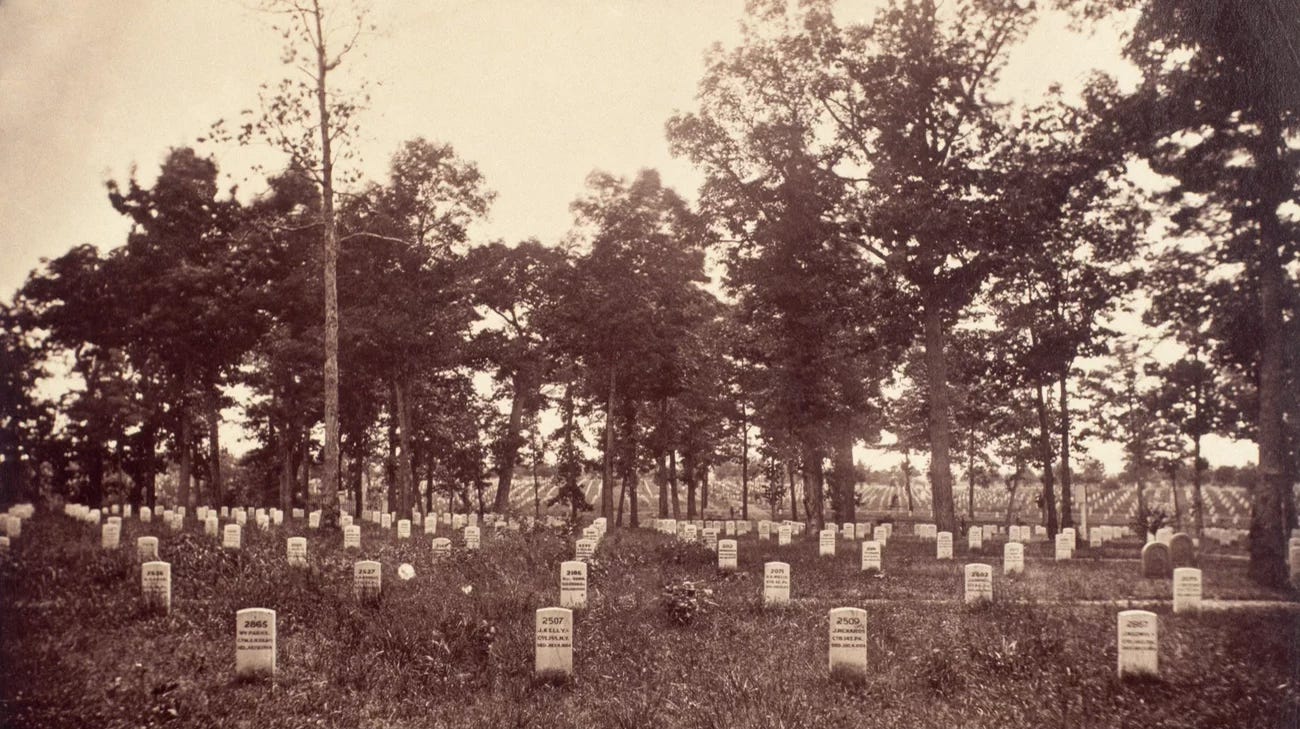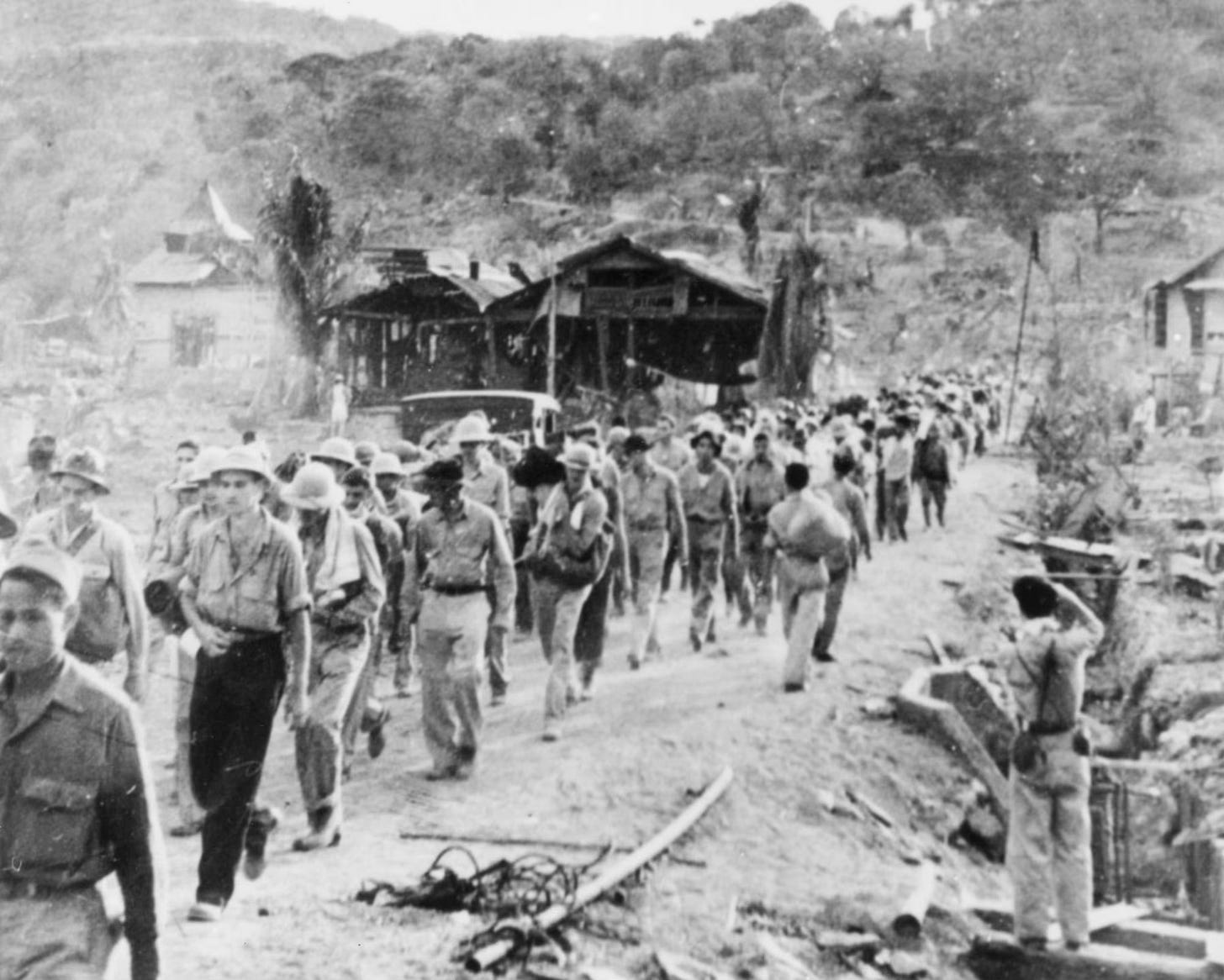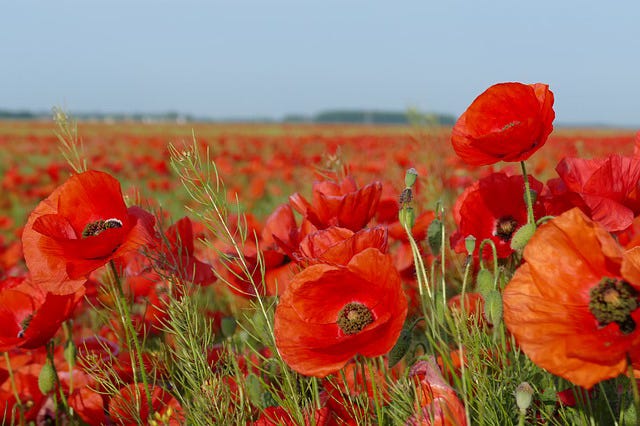The Gulf of Tonkin Incident
In 1964, my ship sailed along the edge of a typhoon to reach the Gulf of Tonkin; ours (USS HENRY W. TUCKER) was one of two ships assigned to replace the USS MADDOX and USS TURNER JOY during a mission that was then called the “DeSoto Patrol” in the South China Sea. They had been fired upon, presumably by North Vietnam gunboats, and the incident led indirectly to a major escalation of U.S. presence in South Vietnam. It would mark the beginning of the Vietnam War.
As a Radioman 3rd Class, my duty was to bring messages, often classified “Top Secret,” from the radio shack to the bridge in treacherous seas that featured 50-ft waves and 45-degree lists as we barreled our way to our assigned destination. The only way to reach the bridge from the radio shack was via an outdoor ladder, which I climbed up and down numerous times during that 48-hour ordeal. The memory of the walls of water sloshing across the deck as I hung on to the ladder railing remains vivid. I salute the young men in the radar room and at the helm on the bridge who did their jobs as our ship bobbed and ducked over, down, and through the massive waves, full speed ahead.
I am proud of my service and my uniform (though I swapped my U.S. Navy peacoat for a Londoner’s Mailman coat and hat; my uniforms were lost in a duffel bag I’d left behind in a garage in L.A.).
I can’t visit the Vietnam Memorial in Washington, D.C. without bawling like a baby while reading the notes and mementos left behind by wives, girlfriends, mothers, fathers, sons, and daughters, of my fallen generation. The messages are stuck in the stone separations between the names of every soldier, sailor, marine, and airman (many aged between 18 and 23 years old) killed during the conflict.
May they rest in peace.
•••
Arlington National Cemetery, Site of First Memorial Day
“We do not know one promise these made, one pledge they gave, one word they spoke,” wrote Congressman and future U.S. President James A. Garfield on May 30, 1868, as he helped consecrate the memory of the dead at Arlington National Cemetery, “but we do know they summed up and perfected, by one supreme act, the highest virtues of men and citizens. For love of country, they accepted death, and thus resolved all doubts, and made immortal their patriotism and their virtue.”
Then Garfield joined some 5,000 participants to help decorate the graves of the more than 20,000 Union and Confederate soldiers buried there.
Thus began the Memorial Day tradition that we continue to honor and that we celebrate today.
There are more than 400,000 buried at Arlington National Cemetery as of this writing, and there are approximately 75,000 remaining grave sites at the 639-acre (originally 200 acres) cemetery; it is expected to reach its limit by 2041.

The Gettysburg Address
Written and delivered by President Abraham Lincoln on November 19, 1863
Four score and seven years ago our fathers brought forth on this continent, a new nation, conceived in Liberty, and dedicated to the proposition that all men are created equal.
Now we are engaged in a great civil war, testing whether that nation, or any nation so conceived and so dedicated, can long endure. We are met on a great battlefield of that war. We have come to dedicate a portion of that field, as a final resting place for those who here gave their lives that that nation might live. It is altogether fitting and proper that we should do this.
But, in a larger sense, we cannot dedicate -- we cannot consecrate -- we cannot hallow -- this ground. The brave men, living and dead, who struggled here, have consecrated it, far above our poor power to add or detract. The world will little note, nor long remember what we say here, but it can never forget what they did here. It is for us the living, rather, to be dedicated here to the unfinished work which they who fought here have thus far so nobly advanced. It is rather for us to be here dedicated to the great task remaining before us -- that from these honored dead we take increased devotion to that cause for which they gave the last full measure of devotion -- that we here highly resolve that these dead shall not have died in vain -- that this nation, under God, shall have a new birth of freedom -- and that government of the people, by the people, for the people, shall not perish from the earth.
In Memory of Phil and all who served
By Henry Schulte
My brother-in-law, Phil Nelson, never spoke of Vietnam. Until one night, I wanted to know. His stories had my jaw hanging. One still haunts me, and I wasn’t even there. He was surrounded by the enemy in an open field. The fighting went on all night. Come morning he was the only one alive.
When he passed, we came across a bunch of medals piled loosely in a small cardboard box, including three purple hearts. Phil had been a hero.
God bless Phil and all the veterans who keep this country free.
We salute you.
We thank you.
•••
Battle of the Bulge
By David Samuel McCalmont
World War II was still raging when I was born just a few days prior to the Germans' last gasp that we now call the Battle of the Bulge. U.S. casualties alone in that unexpected enemy ambush amounted to 9,000 dead and 66,000 injured.
In mere days, we commemorate the 80th anniversary of General Dwight D. Eisenhower addressing his Allied troops with “The eyes of the world are upon you.” Historian Andrew Roberts writes “Operation Overlord represents the greatest single service that the English-speaking peoples rendered civilization.”
Those members of the Greatest Generation were not all heroes. Fear, terror, a longing for home and peace, marched alongside every act of bravery and devotion to duty. That's what makes their story so exceptional. They did what had to be done, despite fear, out of a noble but simple love of country and native soil. This weekend let's go forth in the halo of this somber holiday and continue to fight for the goodness and integrity of this native soil for which hundreds of thousands before us have bled red in its defense.
•••
The Battling Bastards of Bataan
By Andy Caldwell
My father was one of the few survivors of the Bataan Death March. Another survivor, James Murphy, wrote a book on the subject “When Men Must Live.”
As it turns out, our leaders in Washington DC were flummoxed as to the fate of the men and women who were going to be left behind as General Douglas MacArthur was being evacuated. It was upon this occasion that MacArthur famously remarked that he would return. But, as for the fate of the men and women who were not evacuated, but rather abandoned, Secretary of War Harry Stimson remarked, “There are times when men must die.” And die they did. Tens of thousands of Americans and Filipinos in the worst military defeat in American history multiplied by the brutal loss of life in the captivity that followed.
The Bataan Death March survivors who were left behind adopted the following to express their situation:
We’re the battling bastards of Bataan.
No mama, no papa, no Uncle Sam.
No aunts, no uncles, no cousins, no nieces.
No pills, no planes, no artillery pieces.
And nobody gives a damn.”
This is why we have a Memorial Day holiday.
•••
Memorial Day and My Father
By James Fenkner
In the early 1960s, my father served two years in the Army somewhere up in Alaska. As kids, my sisters and I begged to know what, if any, role he played in the Cold War. Did he ever see a nuclear missile? Did he have a secret code? Did he stand in the control room where Armageddon was a flick of the switch away? We will never know. He kept the secrets of his military service to his grave. As a man, I respect him for keeping such a promise, no matter how long ago that promise was made.
That said, we suspect that he spent more time outside a heated bunker than in it. Whenever the subject of snow, ice, or frigid weather, was discussed, even if on the weather channel, he would instinctively shiver. Of all the states he traveled by RV to in his retirement, Alaska was not to be revisited.
But his military service – whatever it involved – never dampened his enthusiasm for America, her traditions, and her flag. When my sisters and I asked him what he would do should he win the California State Lottery, his unorthodox answer wasn’t a surprise. First, he would treat himself to a boat with a flying bridge. Then, he would dedicate the remaining millions to replacing all the torn and faded United States Flags across America.
Some Americans may be rusty as to what this military holiday means or why it even matters. An increasing number of miseducated Americans may be mistaking this day as an unofficial start of summer or an opportunity to save on a mattress or, worse yet, something to do with white supremacy. My father, who would have greeted the sunrise by mounting his immaculate American flag on his modest home, could have straightened them all out.
Armed Forces days is for those still in uniform.
Veterans Day is for those who hung up their uniform.
And Memorial Day is for those who never made it out of their uniform.
On this Memorial Day, millions of patriotic Americans, just like my father, will be flying the flag of this great country.
I salute them all.
•••
Freedom is not Free
By Christy Lozano
If we value freedom and are willing to pay the price, we can always remain free. The Declaration of Independence states, “We hold these truths to be self-evident, that all men are created equal, that they are endowed by their Creator with certain unalienable Rights, that among these are Life, Liberty and the pursuit of Happiness.”
This is our God-given identity as Americans, and when called upon, we stand and, when necessary, we fight. Even when we don’t win, and we endure persecution, as many before us have done, as long as we continue to stand, we remain free. Freedom isn’t always about what is going on around us, Freedom is in us and when we know that, we fight to keep it around us as well.
•••
A True Hero
By Tim Tremblay
Memorial Day has always had a special place in my heart. So many American heroes have laid their lives down for this country over the years so that we might live in freedom. My Uncle Art Petersen, PFC, Paratrooper of the 101st Airborne, Screaming Eagles is a true American World War II Hero. Art earned two Purple Hearts and is the last living soldier of the 8,400 of this elite U.S. Army division. Art saved the lives of so many during WWII and to this day has tremendous appreciation of his fellow military men and women who died that we may live.
•••
In Flanders Fields
In Flanders Fields the poppies blow
Between the crosses, row on row,
That mark our place; and in the sky
The larks, still bravely singing, fly
Scarce heard amid the guns below.
We are the Dead. Short days ago
We lived, felt dawn, saw sunset glow,
Loved and were loved, and now we lie,
In Flanders Fields.
Take up our quarrel with the foe:
To you from failing hands we throw
The torch; be yours to hold it high.
If ye break faith with us who die
We shall not sleep, though poppies grow
In Flanders Fields.
The above poem by John McCrae, a Canadian poet, soldier, and physician, who tended to wounded soldiers during World War I, was written upon the death of a friend, to memorialize the horrific April 1915 battle in and around the Belgian city of Ypres in West Flanders, where an estimated 500,000 soldiers were killed and/or wounded during the 100-day ordeal













Remarkable stories that need to be told over and over. https://www.army.mil/asianpacificamericans/bataandeathmarch.html
Thanks for sharing, excellent presentation
of way we should never leave our soldiers
behind!!!
Bob Bryant